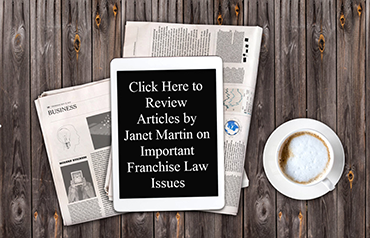What is an FDD?

The Franchise Disclosure Document (FDD), is much like a prospectus in securities law, which outlines extensive and pertinent information about the Franchisor, the Franchise being offered, including costs and obligations as well as examples of the contracts to be signed when a Franchisee purchases a franchise.
The FDD is mandated in its content and overseen by the Federal Trade Commission. In addition, most of the States mandated additional content. The general format of an FDD for every Franchise system will look identical. The table of contents is mandated and the contents must be organized into 23 Items:
Item 1:The Franchisor, And Any Parents, Predecessors and Affiliates (all historical information, and any franchise related information);
Item 2:Business Experience -Bios of the Officers, Directors, Managers (and person in charge of training);
Item 3:Litigation (actions against the franchisor or any person in Item 2, involving franchise laws, securities laws and fraud, includes arbitration);
Item 4:Bankruptcy (involving anyone it Item 1 or 2);
Item 5: Initial Fees (generally what you will pay up front to the Franchisor or affiliates);
Item 6:Other Fees (all other ongoing fees a franchisee may or must pay);
Item 7: Estimated Initial Investment (Total fees arranged by categories, required to get the business up and running, including equipment, leases, software, inventory, etc.);
Item 8:Restrictions on Sources of Products and Services (details about required vendors, etc.);
Item 9:Franchisee’s Obligations (arranged in table referring to the section in the franchise agreement);
Item 10:Financing (Whether or not franchisor provides and terms);
Item 11:Franchisor’s Assistance, Advertising, Computer Systems and Training (includes all franchisor obligations, details of advertising programs or requirements, details of computer requirements and details of training program, including the Table of Contents of the Operations Manual);
Item 12:Territory (description of any exclusive territory, requirements to maintain and exceptions);
Item 13:Trademarks (details about the franchisors trademarks and logos);
Item 14:Patents, Copyrights and Proprietary Information (details about these items);
Item 15:Obligation To Participate in the Operation of the Franchise Business (if any);
Item 16:Restrictions on What the Franchisee May Sell (required products, vendors etc.);
Item 17:Renewal, Termination, Transfer and Dispute Resolution (table with corresponding referenced in the franchise agreement to obligations on the topics);
Item 18:Public Figures (disclosure of any celebrities who publically endorse the franchise);
Item 19:Earnings Claims (anysubstantiated and representative sales, earnings, costs or profits, etc.);
Item 20:Outlets and Franchisee Information (various tables showing # of units, transfers, terminations, openings and closings for past 3 years, including all address of current locations);
Item 21:Financial Statements (audited and 3 year comparative-some exceptions for new franchisors);
Item 22:Contracts (a copy of the franchise agreement and all other contract that may be signed);
Item 23:Receipt (located at end of all the contracts and exhibits; mandated language).
The FDD will contain detailed descriptions of these items; all contracts including all exhibits will be attached. This entire document can be 200 pages. It is sometimes hard to siphon out the actual franchise agreement a franchisee will be signing from all the other documents that may not be relevant.
Contact an Experienced California Franchise Attorney For Help With Your Franchise Disclosure Document FDD
If you are a potential Franchisee, it is critical you have an experienced legal counsel help you interpret what all these disclosures mean, and more importantly, DO NOT mean. If you are a new franchisor seeking to have an FDD created or modified, it is critical you comply with both the federal and your states disclosure laws, and will require an experienced franchise counsel to assist. Either way, Call me today for a consultation: 949-415-2677 or contact an experienced California Franchise Law lawyer.


